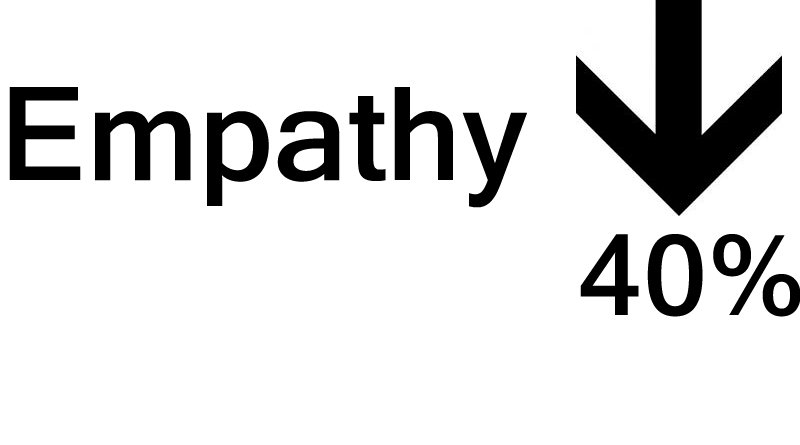What is Empathy? Empathy is the ability to understand and share the feelings of another. It is similar to compassion. However compassion is deeper; it is the ability to not only understand but share in others’ sufferings – not just feelings.
I read Maia Szalavitz’s article ‘Born to love’ in Psychology Today. There Maia delved into the study presented at the annual meeting of the Association for Psychological Science of Michigan researchers. It included data from 14,000 students. This study concluded that empathy was down 40% on the college campus, compared to those who came before them. In fact this study found that these young people did not care about the perception people had of their self-absorbed narcissistic behavior. These young people were more selfish then ever; and not concerned about who they hurt along the way.
Maia looked at a few factors that could have preempted such behavior; she noted the following: without unstructured free time with playmates, children simply don’t get to know each other very well. And you can’t learn to connect and care if you don’t practice these things. Free play declined by at least a third between 1981 and 2003–right when the kids who hit college in 2000 and later were growing up.
Worse, much of the time that used to be spent playing outdoors is now spent in front of screens. Television, obviously cannot teach empathy. Even nonviolent kids’ TV, research finds, is filled with indirect aggression and linked to increased real-world bullying. Though social media is an improvement on passive TV viewing and can sometimes aid real friendships, it is still less rich than face to face interaction. This is especially important for the youngest children whose brains are absorbing social information that will shape the way they connect for the rest of their lives.
She says another factor is the “self esteem movement” and its pernicious notion that “you can’t love anyone else until you love yourself.” Today’s kids grew up with parents who were taught by therapists and self help groups attended by millions that caring too much for other people or having your happiness tied to theirs was “co dependence,”–and that people should be able to be happy on their own, needing no one.
Maia goes on to make a few reflections: one is that we need each other to be both mentally and physically healthy. Solitary confinement, in fact, is one of the most stressful experiences someone can undergo: this wouldn’t be true if most people were happy without social contact. Normal people kept in complete isolation can become psychotic in as little as a few days.
She states further that unless you have been loved well from infancy, loving others is difficult–children who are resilient to early trauma are those who find others to care for them to make up for abusive or neglectful caregivers. If the only love they get is from a therapist or teacher who tells them to love themselves before trying to make other connections, they are extremely unlikely to recover.
Perhaps an even larger factor is the merging of the left’s “do your own thing” individualism with the right’s glorification of brutal competition and unfettered markets. You wind up with a society that teaches kids that “you’re on your own” and that helping others is for suckers. A country where the mystical new age “Secret” is that the rich deserve their wealth and got it by being positive and good–while the poor, too, get what’s coming to them because they didn’t try hard enough.
Maia went on to state that deregulation and reduced taxes on the wealthy from Reagan onwards produced massive growth in economic inequality, which is probably also a critical part of empathy’s decline. Empathy requires an ability to understand others–it’s easiest to do this when you spend time them regularly and know how to read them. Economic inequality, however, by radically separating the rich from the poor and shrinking the middle class, literally physically isolates us from each other and provides few opportunities for connection or understanding. If you spend your time in limos and gated communities and first class, you aren’t likely ever to meet poor people who aren’t there to serve you; outside that context, you won’t know how to relate to them.
She concludes that if you know nothing about someone’s real situation, it’s easy to caricature it as being defined by bad choices and laziness, rather than understand the constraints and limits the economy itself imposes. Seeing yourself doing so well and others doing poorly tends to bolster ideas that “you deserve your wealth,” simply because guilt otherwise becomes uncomfortable, even unbearable.
Now how does all of this fit into the Christian psychology? Are Christians self-absorbed with the same traits of being narcissists? Are they selfish, self-seeking; their way or the high way! Or has this study only revealed a parallel universe. Are Christians always well meaning, looking for the best in others. Are they like Jesus, the sacrificial lamb? if struck, what will they do? What does Isaiah 53 mean today? Will Christians let others go first and be of no reputation. What does a nonbeliever see in a Christian that would make them want to become one? What does a nonbeliever see in a Christian life that would draw them closer to Jesus?
Unfortunately this statistics captures Christians alike. We are as self-absorbed; self-seeking; judgmental; ferocious as the other man who is an unbeliever. Oh yes, we gossip, tear down, blame, hurt and revile. We Christians do it all. In fact it is not just to use that term, I mean label others as unbelievers. I wonder if we have a right to term another as such, when we ourselves are not living worthy of the call.
I believe it is time for us to look in the mirror, and make a new vow and a new commitment to both our faith and our God. If we will, He will help us.
Linda Faith
Linda faith is the Editor in Chief of Jewels Magazine. She co-pastors along with her husband Revival Worship Church, Tampa. She is a prolific writer and powerful speaker, inspiring many women to be all God has called them to be. She is the founder of Joy Women’s conference which reaches out to empower, inspire and motivate women in their faith walk. She was a software developer before she started writing.




0 Comments